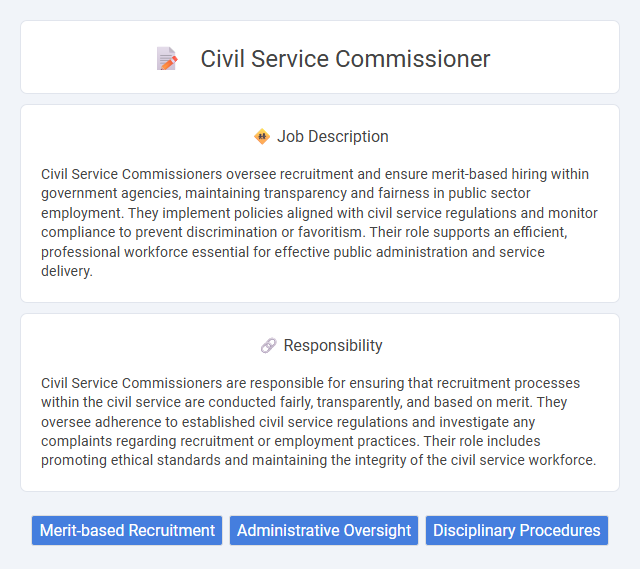
Civil Service Commissioners oversee recruitment and ensure merit-based hiring within government agencies, maintaining transparency and fairness in public sector employment. They implement policies aligned with civil service regulations and monitor compliance to prevent discrimination or favoritism. Their role supports an efficient, professional workforce essential for effective public administration and service delivery.
Individuals with strong integrity, impartiality, and a commitment to public service are likely suitable for the role of Civil Service Commissioner. Those who can objectively evaluate public sector processes and uphold ethical standards may find the position aligns well with their skills and values. Candidates struggling with bureaucratic systems or lacking fairness may face challenges in fulfilling the responsibilities effectively.
Qualification
Civil Service Commissioners typically require a bachelor's degree in public administration, human resources, or a related field, with many positions favoring candidates holding advanced degrees or professional certifications such as SHRM-CP or IPMA-CP. Extensive experience in government administration, policy implementation, or personnel management is essential, often complemented by strong knowledge of civil service laws and regulations. Analytical skills, integrity, and the ability to oversee merit-based hiring processes are critical qualifications for ensuring fairness and transparency in public sector employment.
Responsibility
Civil Service Commissioners are responsible for ensuring that recruitment processes within the civil service are conducted fairly, transparently, and based on merit. They oversee adherence to established civil service regulations and investigate any complaints regarding recruitment or employment practices. Their role includes promoting ethical standards and maintaining the integrity of the civil service workforce.
Benefit
The Civil Service Commissioner role likely offers competitive benefits, including job security and pension schemes reflecting public sector standards. Candidates may expect access to professional development opportunities designed to enhance career growth within government services. Health and well-being programs are probably part of the package, supporting long-term employee satisfaction and performance.
Challenge
The Civil Service Commissioner role likely presents the challenge of balancing impartiality with the need to implement evolving government policies effectively. Navigating complex regulatory frameworks and ensuring fair recruitment processes may require strong analytical skills and resilience. There is a probability that managing competing stakeholder interests could add to the complexity of this position.
Career Advancement
Civil Service Commissioners play a critical role in overseeing the integrity and fairness of public sector recruitment, providing ample opportunities for career advancement through specialization in human resources, policymaking, and regulatory compliance. Professionals in this position often progress to senior leadership roles within government agencies, leveraging their expertise in merit-based recruitment and public administration. Continuous skill development in labor laws, conflict resolution, and strategic HR management enhances prospects for promotion and influence over civil service reforms.
Key Terms
Merit-based Recruitment
Civil Service Commissioners oversee merit-based recruitment processes to ensure fair and transparent hiring within government agencies. They enforce policies that prioritize candidates' qualifications, skills, and experience, eliminating favoritism and discrimination. Their role is critical in maintaining a competent and impartial public workforce dedicated to effective public service delivery.
Administrative Oversight
Civil Service Commissioners ensure rigorous administrative oversight by monitoring recruitment, promotion, and disciplinary processes within public sector organizations. They enforce adherence to civil service regulations and ethical standards, safeguarding fairness and transparency in personnel management. Their role includes investigating complaints and implementing corrective measures to maintain integrity and efficiency in government operations.
Disciplinary Procedures
Civil Service Commissioners oversee disciplinary procedures ensuring compliance with established regulations and fairness in investigations. They uphold transparency by reviewing allegations of misconduct, evaluating evidence, and recommending appropriate sanctions based on Civil Service rules. Their role is critical to maintaining integrity and accountability within public sector employment.
 kuljobs.com
kuljobs.com